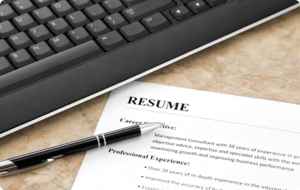- Featured in:

What are Leadership Skills?
Leadership skills are traits, attributes and learned behaviors that help to motivate, guide, delegate, organize, and assume responsibility for other people.
With the great power of being in charge comes the responsibility to wield that influence positively and effectively. While everyone might like the idea of being the boss, not every person excels at leadership.
Companies need to attract skilled leaders for executive, managerial, educational or senior-level roles because they directly impact organizational function, staff morale, overall productivity and company performance.
Leadership skills will not be expected or demanded for most entry-level roles, except for educational roles where those skills are essential to hold a group’s attention and convey important information.
Just keep in mind that since leadership skills are soft skills, you also need to mention hard skills on your resume to ensure you cover all your bases. It’s best to feature a mixture of both types of skills on your resume.
Types of Leadership Skills
While leadership is in and of itself a skill, it can also be broken down into component skills that make a great leader.
You will make a far more convincing case if you outline the more specific skills that exemplify the foundation of your leadership style instead of just listing leadership as a single skill.
Let’s outline and explain some of the top leadership-related skills employers tend to seek:
Ability to teach and mentor
The core of leading a group of people is teaching and guiding them by making use of your experience and knowledge. So, it helps to be good at passing on and teaching others about accomplishing tasks and goals for the most favorable outcome.
Active listening
More and more businesses understand that to improve overall company morale and function, it pays to listen to your employees; after all, they’re on the frontlines of the business. Many companies will specifically seek out managers who make it a point to listen to their employees.
Conflict resolution
Within any organization, problems or differences of opinion are bound to occur. To ensure that these surprises don’t have a lasting negative impact on business, conflict resolution is an essential tool to diffuse and work past any issue that may arise.
Decision making
One of the more stressful aspects of leadership is making decisions that can significantly impact the company and its staff. So, it resonates with employers if it’s a strength of yours to be authoritative, decisive, and wise about your choices.
Delegation
Part of what makes a great leader is the ability to see the task at hand and the resources that you’re working with to best tackle it. Delegation is crucial to ensure that tasks get done on time and efficiently. Being able to make smart use-of-labor decisions can be of great benefit to many companies.
Dependability
It should go without saying, but since roles that require leadership usually bear a lot of responsibility, being dependable is an essential requirement. Otherwise, it could create a whole host of problems and poor company performance.
Goal-setting
Leaders should identify and prioritize the most important goals to help their organization and teams thrive and succeed. It’s important that the goals set are both realistic and will benefit the organization’s overall mission.
Motivation
Work is hard; that’s why many businesses can often have issues keeping their employees focused and on-task. Good leaders should inspire and motivate their team to keep their eyes on performance and prevent distraction or project stagnation.
Team building
A good long-term strategy for any business to keep employees happy and improve how individuals work together is through team-building skills. If it’s in your skill set to design, organize, or guide team-building strategies or activities, you may be a valuable asset to a company.
Problem-solving
The way that a company responds to adversity, crisis, or even minor hiccups can make or break them! So, it follows that strong problem-solving skills are in high demand in seeking candidates for leadership positions. Like a good ship captain, leaders understand how to navigate the choppy waters of a storm back to smooth sailing.
Other top leadership skills
Here’s a list of additional leadership skills that are also very much desired, depending on the role:
- Assertive
- Assessing
- Business analysis
- Clarity
- Collaboration
- Communication
- Confidentiality
- Critical thinking
- Detail-oriented
- Diplomatic
- Engagement
- Ethical
- Evaluation
- Expectation setting
- Helpfulness
- Honesty
- Initiative
- Integrity
- Loyal
- Management
- Morale boosting
- Positive reinforcement
- Proactive forecasting
- Professionalism
- Recognition and reward
- Reliability
- Research
- Sociable
- Teamwork
- Timeliness
- Truthfulness
- Understanding cultural differences
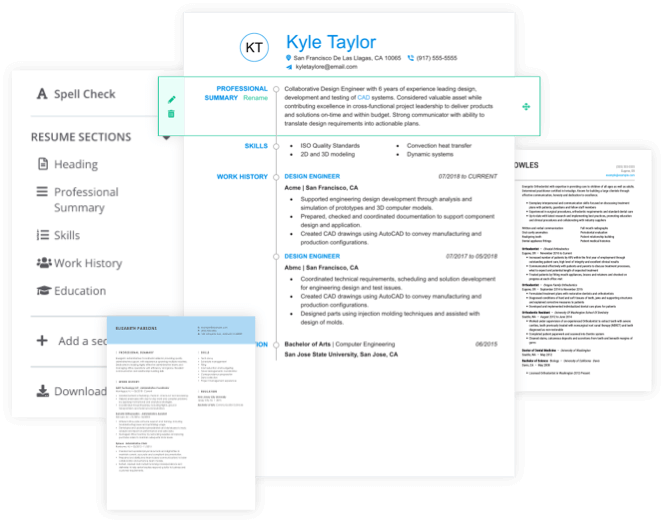
How to Showcase Leadership Skills
Next, we’re going to outline the best strategies that you can use to address your leadership skills on your resume, cover letter and –– with hope –– your interview!
To prep yourself for all three, this is going to be the process:
This is where employers tell you what skills they need to fill the position. You should tailor your resume and cover letter for each job that you apply to. Speaking directly to an employer’s requests will resonate and garner more serious consideration.
After you’ve locked in on the key skills an employer wants from the ad, consider your employment history and what experiences you have to demonstrate why you’re a good fit for the job! Use the same phrasing listed in the job description to show that you have an eye for detail and help pass an applicant tracking system (ATS).
ATS are software programs sometimes used to prescreen candidates before any hiring manager looks over the resumes. You will stand a much better chance of passing an ATS if you use the exact language of the job ad.
Leadership skills on your resume
There are two main ways to feature skills in your resume. The first is to include a dedicated “Skills” section and list them. The second is to sprinkle them in the descriptions of your work experience.
For instance, instead of just listing the skill “delegation,” you could choose to feature it in bullet points detailing your work history, such as “Assessed and delegated labor process resulting in 24% increase in labor efficiency.”
We go over all the ways you can incorporate skills into your resume in our guide: How to Write Skills.
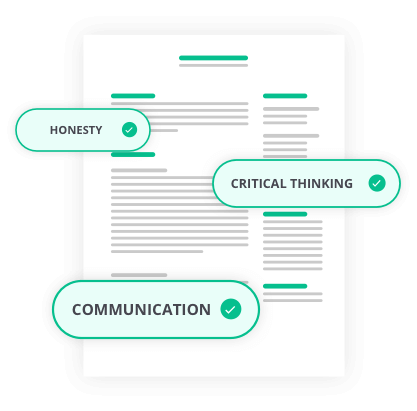
Even more useful, JobHero’s Resume Builder will help make it easier to showcase your leadership skills because it preloads some options for you to include in your skills section. In addition to the fact that the builder automates the whole resume writing process for you, it will save you a lot of time!
Leadership skills in your cover letter
Your resume is not the only place that you should mention your skills! Your cover letter provides the opportunity to tell a story that persuades a hiring manager to believe you have the skills needed.
The first paragraph of a cover letter is ideal to mention the top two to three skills you want an employer to know about.
The second paragraph of your cover letter is also a place to mention your leadership skills. However, this is supposed to be the real core of your argument about why you should be hired. So, if you bring up skills in the second paragraph, you’re going to elaborate.
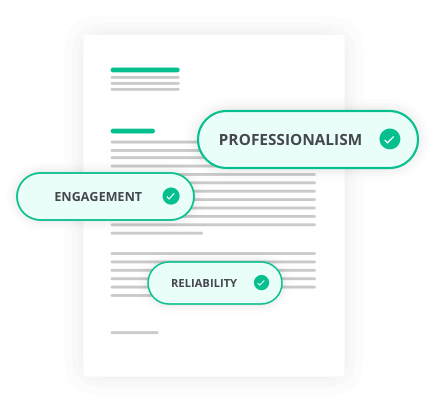
Do so by telling a story that demonstrates the effectiveness of your leadership skills. This will help convince a hiring manager that you’re the person for the job.
Even better, you can also make use of JobHero’s Cover Letter Builder for an extra advantage to create a professional and well-written document.
The builder will save you time and effort to create a compelling document because the whole process is automated and draws from a database of suggested phrases created by career experts.
That way, you can be certain that your leadership skills are incorporated into your letter with ease and professionalism!
Leadership skills in an interview
If you’ve managed to land an interview, that’s exciting news! We’ve got some good tips for how to discuss your skills in an interview.
The main thing to keep in mind regarding discussing skills on a resume versus in an interview is that the interview will be more conversational. So, you mustn’t just mention you have a skill; you’ve got to explain it!
When an employer gives you a window for an interview, they’re looking for a complete picture of what you’re like as an employee. They need the whole story.
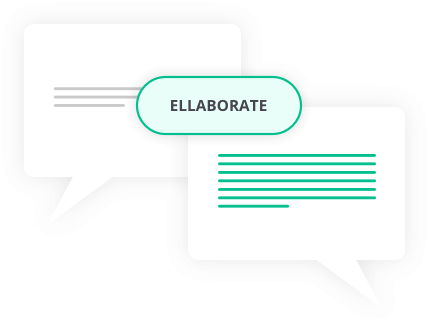
Justify your skills by giving examples of how you put them to good use. Then, the employer can better imagine how valuable your skills are for their business.
After all, it’s one thing to claim that you’re good at something; it’s much more convincing and believable if you tell a little story about it.
For example, someone applying for a role as a restaurant manager could provide an answer to a common prompt like: “Tell me about yourself.”
“I’m the kind of manager who places great emphasis on server training, education and product knowledge. For instance, in my last role, I instituted weekly wine tastings for the staff and the restaurant saw a 22% increase in the volume of wine sales as a direct result. It also helped with our team building and overall mindfulness as a staff ”
Note how in this example, the interviewee backs up their initial claims by just providing a little bit of explanation of how those traits impact the restaurant in practice.
Use a similar tactic to discuss your top skills!
Here’s a tip: Before the interview, look at the top skills that you mentioned in your resume, and for each, think about the best example, story, or anecdote that you could discuss.
Keep these skill illustration stories fresh in your mind. That way, during the interview, you won’t feel like you’re stumbling or at a loss of what achievements you want to discuss.
Improve Your Leadership Skills
So many people want to find a way to better their leadership skills that they attend seminars, workshops and read books about the subject.
One of the most concrete ways to hone this skill set beyond working your way up to a management position is to volunteer or mentor.
There is no shortage of opportunities in this realm, especially if you’re willing to mentor or tutor. Then you will have a great venue for you to work on these types of skills!
The most central of all these skills is going to be motivation.
Motivation is the core by which all leadership happens, and it’s bound to develop if you take the time to work with youths or anyone you’re trying to instruct!
Of course, whenever you gain experience, keep your eyes set on the bigger picture of your development by keeping in mind this helpful article about the Top 5 Leadership Skills for the Workplace of Tomorrow.
Related Articles



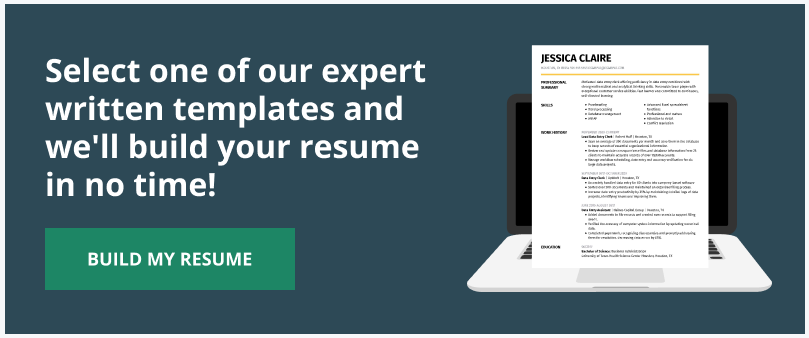
 Read the job description carefully.
Read the job description carefully. Match your skills to the job description.
Match your skills to the job description.

